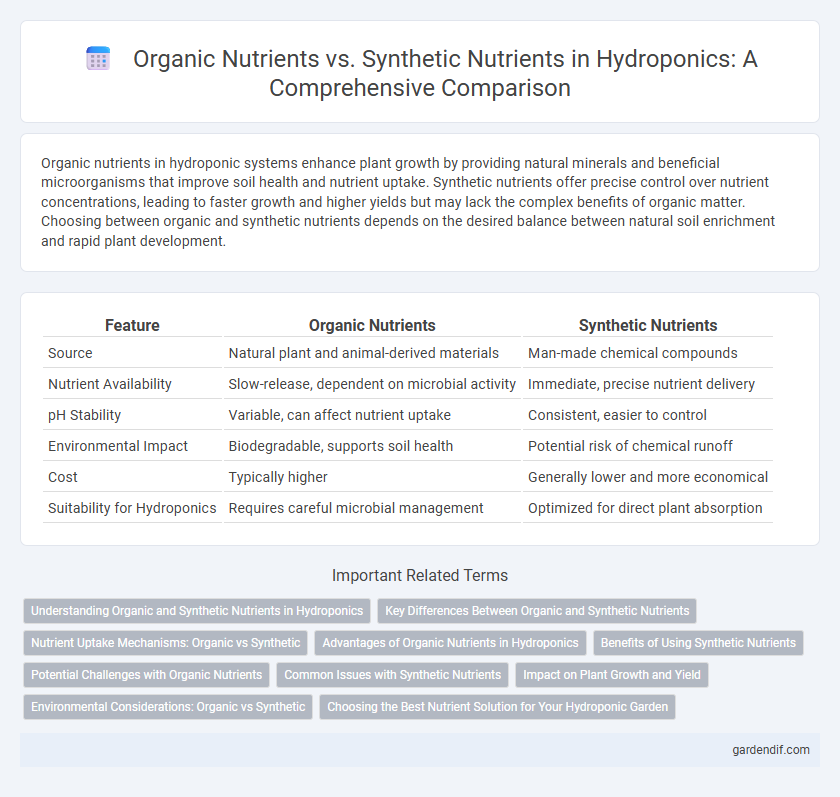
Organic Nutrients vs Synthetic Nutrients Illustration
Organic nutrients in hydroponic systems enhance plant growth by providing natural minerals and beneficial microorganisms that improve soil health and nutrient uptake. Synthetic nutrients offer precise control over nutrient concentrations, leading to faster growth and higher yields but may lack the complex benefits of organic matter. Choosing between organic and synthetic nutrients depends on the desired balance between natural soil enrichment and rapid plant development.
Table of Comparison
| Feature | Organic Nutrients | Synthetic Nutrients |
|---|---|---|
| Source | Natural plant and animal-derived materials | Man-made chemical compounds |
| Nutrient Availability | Slow-release, dependent on microbial activity | Immediate, precise nutrient delivery |
| pH Stability | Variable, can affect nutrient uptake | Consistent, easier to control |
| Environmental Impact | Biodegradable, supports soil health | Potential risk of chemical runoff |
| Cost | Typically higher | Generally lower and more economical |
| Suitability for Hydroponics | Requires careful microbial management | Optimized for direct plant absorption |
Understanding Organic and Synthetic Nutrients in Hydroponics
Organic nutrients in hydroponics derive from natural sources such as composted plant and animal matter, providing a complex nutrient profile rich in micronutrients and beneficial microbes that enhance plant health. Synthetic nutrients consist of chemically formulated compounds designed for rapid nutrient availability and precise control over macronutrient ratios like nitrogen, phosphorus, and potassium. Understanding the differences between organic and synthetic nutrients helps optimize hydroponic systems by balancing nutrient release rates, bioavailability, and environmental impact for improved crop yield and quality.
Key Differences Between Organic and Synthetic Nutrients
Organic nutrients in hydroponics are derived from natural sources such as compost, manure, and plant residues, providing a slow-release supply of essential elements that improve microbial activity and soil health. Synthetic nutrients are chemically formulated, offering precise control over nutrient concentrations and immediate availability to plants, which can enhance growth speed and yield in hydroponic systems. The key difference lies in nutrient source origin and release rate, with organic nutrients promoting sustainability and soil vitality, while synthetic nutrients prioritize efficiency and predictability.
Nutrient Uptake Mechanisms: Organic vs Synthetic
Organic nutrients in hydroponic systems rely on microbial activity to break down complex compounds into bioavailable forms, enhancing nutrient uptake through root-associated microbes and promoting a balanced rhizosphere. Synthetic nutrients provide readily soluble ions, ensuring immediate availability and consistent absorption by plant roots via direct ion exchange mechanisms. The choice between organic and synthetic nutrients influences root morphology and microbial interactions, which are critical for optimizing nutrient uptake efficiency in hydroponic cultivation.
Advantages of Organic Nutrients in Hydroponics
Organic nutrients in hydroponics enhance microbial activity, improving nutrient availability and promoting healthier root development compared to synthetic alternatives. These nutrients release essential minerals slowly, reducing the risk of nutrient burn and creating a more balanced growing environment. Organic options also support sustainable practices by recycling natural materials, minimizing chemical residues in crops and water systems.
Benefits of Using Synthetic Nutrients
Synthetic nutrients provide precise control over the nutrient composition, ensuring optimal growth and higher yields in hydroponic systems. They are formulated for rapid nutrient availability, promoting faster plant development and reducing nutrient deficiencies. Consistent quality and solubility make synthetic nutrients ideal for automated hydroponic setups, maximizing efficiency and crop uniformity.
Potential Challenges with Organic Nutrients
Organic nutrients in hydroponic systems often present challenges such as slower nutrient availability compared to synthetic options, potentially limiting rapid plant growth acceleration. They can also increase the risk of microbial contamination and biofilm formation in water reservoirs, which may impair system efficiency and plant health. Moreover, maintaining consistent nutrient concentrations is difficult due to the variable composition of organic inputs, complicating precise nutrient management.
Common Issues with Synthetic Nutrients
Synthetic nutrients often cause nutrient imbalances and salt buildup in hydroponic systems, leading to root burn and reduced plant growth. Their rapid availability can disrupt the natural microbial activity essential for healthy root development. Over time, reliance on synthetic fertilizers may lead to environmental concerns due to runoff and soil degradation.
Impact on Plant Growth and Yield
Organic nutrients in hydroponic systems enhance microbial activity and improve nutrient availability, leading to sustainable plant growth and higher nutrient density in crops. Synthetic nutrients provide precise nutrient formulations for rapid nutrient uptake, promoting faster growth rates and potentially greater yields in controlled environments. Balancing organic and synthetic inputs can optimize overall plant health and maximize hydroponic crop productivity.
Environmental Considerations: Organic vs Synthetic
Organic nutrients sourced from natural materials promote soil health and enhance microbial activity, reducing environmental pollution and supporting sustainable hydroponic systems. Synthetic nutrients, while offering precise nutrient control and rapid plant uptake, often contribute to nutrient runoff and potential chemical buildup, increasing ecological risks in aquatic ecosystems. Choosing organic nutrients aligns with eco-friendly practices by minimizing synthetic chemical use and fostering long-term environmental balance.
Choosing the Best Nutrient Solution for Your Hydroponic Garden
Choosing the best nutrient solution for your hydroponic garden depends on the balance between organic nutrients and synthetic nutrients, as both impact plant growth and yield differently. Organic nutrients provide natural minerals and beneficial microbes that improve soil health and promote sustainable growth, while synthetic nutrients offer precise control over nutrient levels and faster absorption rates. Evaluating factors like plant type, growth stage, environmental conditions, and desired harvest quality helps determine whether an organic or synthetic nutrient solution optimizes your hydroponic system's productivity.
Organic Nutrients vs Synthetic Nutrients Infographic

 gardendif.com
gardendif.com